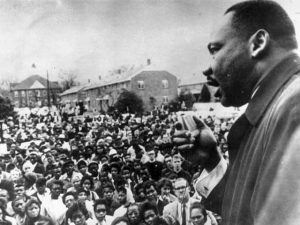Asad Haider at n+1:
 King was not the empty symbol Reagan and others claimed he was. He was a revolutionary, if one committed to nonviolence. But nonviolence does not exhaust his philosophy. As political theorist Brandon M. Terry puts it, King was not only an icon, but “a vital political thinker.” A half a century ago, Terry argues, King theorized the foundations of racism in a way that vastly surpasses the fashionable contemporary ideologies that “treat racism as near-immutable and overstate its explanatory effects.” As Terry points out, King understood that the racial question was overdetermined by wage stagnation, the declining power of organized labor, and the expulsion of workers from employment by automation. King had come to believe that transforming this structural injustice could only be achieved through mass civil disobedience.
King was not the empty symbol Reagan and others claimed he was. He was a revolutionary, if one committed to nonviolence. But nonviolence does not exhaust his philosophy. As political theorist Brandon M. Terry puts it, King was not only an icon, but “a vital political thinker.” A half a century ago, Terry argues, King theorized the foundations of racism in a way that vastly surpasses the fashionable contemporary ideologies that “treat racism as near-immutable and overstate its explanatory effects.” As Terry points out, King understood that the racial question was overdetermined by wage stagnation, the declining power of organized labor, and the expulsion of workers from employment by automation. King had come to believe that transforming this structural injustice could only be achieved through mass civil disobedience.
As a theorist of inequality, King is our contemporary. But he was also a philosopher of equality, and thus of emancipation. At the core of his thought one finds the political subjectivity that the civil rights struggle was helping to engender. Important as his final year was, the radical outlines of this project are visible from 1955 to 1963, as King was drawn deeper into political activism and answered the call to engage in a political sequence that exceeded the boundaries of the existing situation.
more here.
